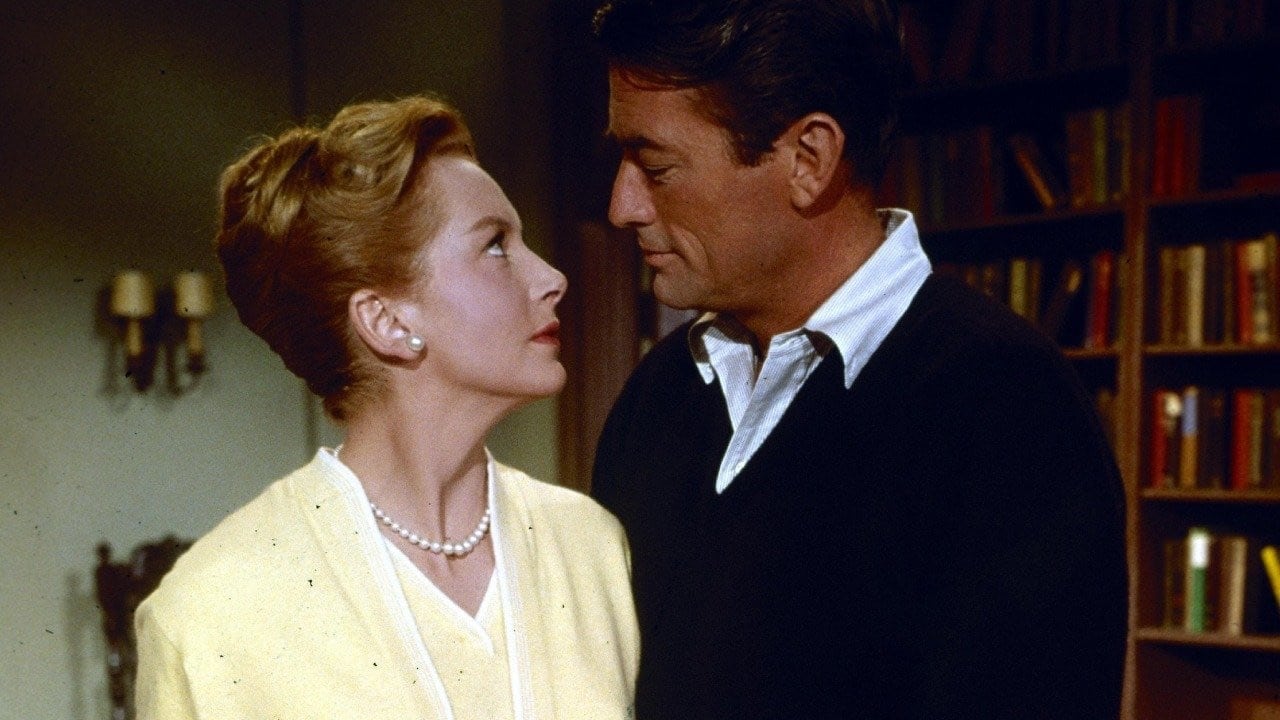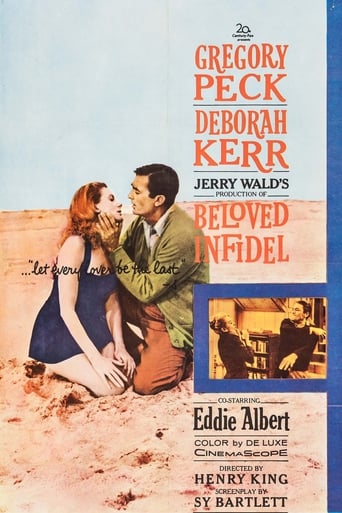

Very disappointed :(
... View MoreHow sad is this?
... View MoreBlending excellent reporting and strong storytelling, this is a disturbing film truly stranger than fiction
... View MoreIt's simply great fun, a winsome film and an occasionally over-the-top luxury fantasy that never flags.
... View MoreBeloved Infidel is the story of the real life romance between Hollywood gossip columnist Sheilah Graham (Deborah Kerr) and legendary writer F. Scott Fitzgerald (Gregory Peck). It is based on Graham's autobiography and the story is definitely told through her eyes. Plain and simple, the story is a soap opera and the quality of writing fits it. For a story about two professional writers, the script fails to properly develop the characters. Graham has one scene about 40 minutes in when she opens up a reveals the truth about herself, but it is not built on and scarcely mentioned again as the story transitions to a focus on Fitzgerald's drinking, which comes out a left field.Kerr gives a good performance given how little she has to work with, and Peck tries his best to match her. However, Peck is a little miscast in this role as the emotionally troubled Fitzgerald. In between well done emotional outbursts, Peck reverts to his traditional stoicism, which works well in many of his other roles, but feels slightly out of place here. There is also a surprising no appearance by or hardly a mention of Fitzgerald's wife, Zelda. A fascinating person who at this point in her life was in a sanitarium. That is just one example of Graham's influence on the script, keeping the focus off of her lover's wife. Ultimately, Beloved Infidel is probably not worth your time unless you are a big fan of F. Scott Fitzgerald or Deborah Kerr.
... View MoreIt is rather strange that the story of the great American novelist, F. Scott Fitzgerald (Gregory Peck), ends up being told, here, by the transplanted American gossip columnist, Sheilah Graham (Deborah Kerr). But, however melodramatic this picture may come off, we must remember that it is HER story--not his. His full life story is referred to, here, more in retrospect, but his struggle with alcohol is well documented.I find that great film scores often elevate a movie, and the score by Franz Waxman does wonders here. This was the era of great film scores, scores that often outlasted the overall effect of the movie. This is one of 3 movies in which Gregory Peck and Eddie Albert co-star, so this combination must have worked for both of them.
... View MoreOne of the quirks of the English language is that although the words "infidel" and "infidelity" both derive from the same Latin root, meaning "unfaithful", they normally have differing meanings in English. "Infidelity" generally refers to adultery or sexual unfaithfulness, whereas an "infidel" normally means someone who does not believe in the tenets of a particular religion. It would be unusual, to say the least, to use the word "infidelity" to mean religious unbelief or to call an adulterer an "infidel". This film, however, is not concerned with the religious beliefs, or lack of them, of its main character, the writer F. Scott Fitzgerald. (He was raised as a Catholic but does not appear to have been a particularly devout one in adult life). I can only therefore assume that the title refers to his infidelity to his wife, Zelda.When I heard that the film was based on the life of Fitzgerald, I assumed that it would be about his wild and tempestuous life with Zelda during the twenties and early thirties. Instead, it concentrates on the last few years of his life, the period 1937 to 1940, and his relationship with his mistress, the journalist and gossip columnist Sheilah Graham. Indeed, Zelda does not appear in the film, although she is referred to. By 1937 Zelda was suffering from mental illness and was confined to a psychiatric hospital, but she and Scott were still married. Indeed, the two were never to divorce, and she legally remained his wife until his death.The main problem with the film is that of miscasting. Gregory Peck's most frequent screen image was that of an authoritative, rational and gentlemanly figure, so he does not really seem a natural choice to play a notorious hell-raiser like Fitzgerald. Peck occasionally succeeded in his efforts to break away from his normal persona, as in "Duel in the Sun", "The Boys from Brazil" or "Moby Dick" in which he made a notable Captain Ahab, but in several other films attempts to cast him against type fell flat. A good example is "Macarthur" from the latter part of his career, in which he never succeeded in capturing General Macarthur's aggressive, combative personality. In the initial part of this film Peck portrays Fitzgerald as yet another quiet, charming gentleman, and his portrayal is certainly convincing, although I did find myself wondering how close it was to the real Scott Fitzgerald. His past struggles against alcoholism are referred to, but for a while it seems as though he has conquered his addiction. Midway through the film, however, Fitzgerald falls off the wagon after he is sacked from his job as a Hollywood scriptwriter, and Peck is much less convincing as a violent, abusive drunk than he is as a gentlemanly intellectual. For a film made in the 1950s, with the Production Code still in force, this one is remarkably sympathetic in its treatment of adultery. Sheilah Graham is very much the heroine of the film, not its villain. (That is perhaps not surprising given that the film was based on her own memoirs. Fitzgerald had died in 1940 but Graham was still very much alive in 1959). She is portrayed as a kindly and understanding lover, patiently trying to help Scott deal with his problems, rather than as the heartless seductress which during this period was the standard cinematic image of women sexually involved with another woman's husband. Deborah Kerr was one of the screen's most famous "good girls", although she also had the ability to portray characters who hid passionate natures beneath a quiet, reserved surface, such as Karen, the adulterous Army wife in "From Here to Eternity", the troubled Sister Clodagh in "Black Narcissus", the haunted governess in "The Innocents" or another haunted governess, Miss Madrigal in "The Chalk Garden", in that case haunted by guilt rather than by anything supernatural. In "Beloved Infidel", however, Kerr seemed unable to draw upon this ability, and her Sheilah comes across as a character who is all surface with nothing much going on underneath. Kerr also fails to make the most of another aspect of her character, the toughness and determination which enabled her to rise from poverty in Britain to become one of the most famous women in America. There are some good things about this film- the script is a good one and it is attractively photographed. For a film of its period it has touches of originality, breaking away from the traditional "eternal triangle" concept of marital infidelity, a triangle composed of a weak, erring husband, a saintly, long-suffering wife and a wicked other woman. (This concept was not confined to the fifties, or even to the Production Code era; "Fatal Attraction" is a good example from the late eighties, and examples can still be found today). I felt, however, that it might have been better had alternative actors been found for the two leading roles. 6/10
... View MorePoor Zelda. Pity their poor daughter as well. With parents such as F. Scott Fitzgerald and Zelda, what was to happen to this young lady?Gregory Peck was weak in the opening scenes. I love the way he pronounced Sheila,stressing the second part of her name. His voice sounded so different for this film. It is when he is drunk in the film, he is at his absolute best. He is truly believable when he allows liquor to insult and almost end his tempestuous relationship with Kerr.We're dealing basically with 2 very insecure people. Sheila Graham, coming from a very poor background, acted like a prima dona in comparison. Fitzgerald could not deal with disappointment and failure.Eddie Albert's role is also complex here. For one, he acts by giving advice similar to his Burt McGuire in 1955's "I'll Cry Tomorrow." Yet, in the following scene, he wants Kerr to get a detective to stop Peck's apparent harassment. Interesting that Peck and Albert had appeared together in 1953's "Roman Holiday," and that Kerr was married to Philip Ober in 1953's "From Here to Eternity." He played Kerr's editor here.I loved the beach scene in this film when Kerr literally lets her hair down and confesses to Peck regarding her humble beginnings. As they stretched out on the beach, I thought we'd have a replay of "From Here to Eternity." Debbie, you loved the beach, didn't you?
... View More